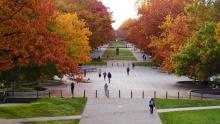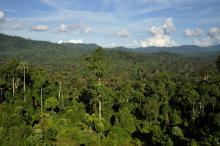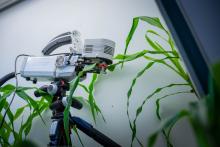A new digital radio telescope and quantum materials 'foundry' are among the UBC projects being supported by almost $23 million in funding from the Canada Foundation for Innovation (CFI).
The grants are part of the CFI's Leading Edge Fund and New Initiatives Fund, which support infrastructure and state-of-the-art equipment for innovative science.
A total of $215 million was awarded for 75 projects at 34 institutions across Canada. UBC researchers are leading nine of the funded projects--four investigators in the Faculty of Science are leading projects worth $8 million.
Among the projects is a digital radio telescope near Penticton, B.C. for the Canadian Hydrogen Intensity Mapping Experiment (CHIME) that will “listen” for comic sound waves and help scientists understand the recent accelerating expansion of the Universe and the nature of the mysterious 'dark energy' which drives it.
"From the big question of the age of the Universe to the minute differences in single-cell genome, UBC researchers are leading our understanding of the world around us," said John Hepburn, UBC Vice President Research and International. "The continued support from the Canada Foundation for Innovation will undoubtedly accelerate discovery and real-world applications of this new knowledge."
"Research and innovation is a forceful driver of growth in our communities," said Gilles G. Patry, president and CEO of the Canada Foundation for Innovation. "Today's funding will allow a talented group of researchers and students to create the solutions, products and ideas Canada needs to prosper."
A Digital Radio Telescope for CHIME: Three Dimensional Mapping of the Largest Volume of the Universe to Date Principal investigator: Mark Halpern ($4.6 million)
The Canadian Hydrogen Intensity-Mapping Experiment (CHIME) will study the dark-energy-driven acceleration of the expansion of the Universe. A new telescope will be built in Penticton B.C. to measure the largest volume of the Universe ever surveyed. CHIME will map out vast uncharted regions of the Universe and use these data to provide a history of the expansion of the Universe, thereby unveiling the physics of dark energy.
Quantum Materials and Devices Foundry Principal investigator: George Sawatzky ($1.7 million)
Quantum materials manifest a wide range of astonishing electronic and magnetic phenomena that embody the central scientific questions challenging the field of condensed matter physics. Devices fabricated from quantum materials are driving technological advances that hold enormous potential to revolutionize consumer electronics, telecommunications, next-generation computing, alternative energy and medicine. The new investment will continue to build on UBC’s expertise and leadership in this fast evolving area.
Envirotron for Plant Adaptation Research Principal investigator: Loren Rieseberg ($1 million)
By growing and studying plants in an envirotron – a facility for growing plants under precise environmental conditions – UBC researchers will learn how plants respond to heat and drought stress, higher atmospheric carbon dioxide, and increased pressure from pests, and to pinpoint the genes underlying variation in these responses. Such knowledge will enable matching of crop and tree genetic profiles with appropriate current and predicted climates, and help produce crops and trees that are more productive, resilient to environmental variation, and resistant to fungal and insect pests.
Quantum Materials and Devices in the MicroKelvin Regime Principal investigator: Joshua Folk ($659,400)
This New Initiatives Fund grant will help build the coldest experimental platform for electronics measurements in Canada – and more convenient measurement access to ultra low temperatures than anywhere else in the world. The facility will help UBC scientists better understand superconductivity and contribute to the realization of quantum materials in everyday lives.
Musqueam First Nation land acknowledegement
We honour xwməθkwəy̓ əm (Musqueam) on whose ancestral, unceded territory UBC Vancouver is situated. UBC Science is committed to building meaningful relationships with Indigenous peoples so we can advance Reconciliation and ensure traditional ways of knowing enrich our teaching and research.
Learn more: Musqueam First Nation
Faculty of Science
Office of the Dean, Earth Sciences Building2178–2207 Main Mall
Vancouver, BC Canada
V6T 1Z4


